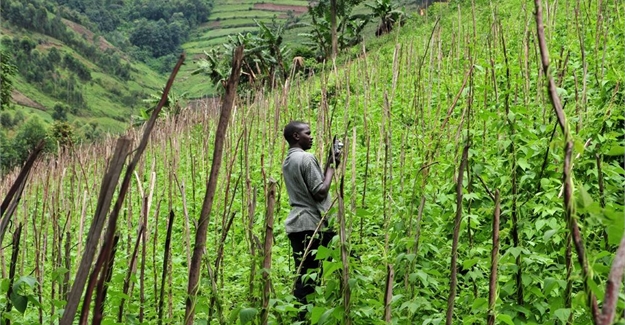The economy of Ethiopia is dominated by small-scale farming that is a source of food, raw materials for agribusinesses and employment opportunities for 85 percent of the population. The small-scale farming has also a lion's share for export earnings though it has been characterized by rainfed and subsistence. And when it faces extreme weather, farmers incur considerable losses that result in negative economic impact. Hence, to overcome the problem, providing insurance services for the farmers has been taken as a way out and some positive out comes are evident as a result.
Nyala Insurance Company General Manager Solomon Zegeye said that since 2009 the Company in collaboration with the Ethiopian Meteorology Agency, the Ministry of Finance and Economic Development and the Ministry of Environment, Forest and Climate Change has been providing insurance services to farmers in different states. Currently, the farmers in Tigray, Oromia, Amhara, Benishangul Gumuz, Gambella and Southern Nation, Nationalities and Peoples' State are benefiting from the weather index insurance project.
According to Solomon, before getting the insurance service, farmers must be a member of farmers cooperative association and the association must buy the premium from the insurance company. In connection to this, Nyala Insurance Company before providing the service, it purchases the weather index data regarding the amount of rainfall which rained for many years in the farmers' plots from the Ethiopian Meteorology Agency; and after referring the data with the situation on the ground by the agronomists, it pays the insurance money to the farmers.
According to Tsegaye Tekle, the Director of Agro Meteorology at the Ethiopian Meteorology Agency, in accordance with the proclamation number 202/1980 that operates at national network, metro stations designed to represent various climatic regions to support various national development plan and activities. It also gives warning on adverse weather conditions and disseminates information. And since 2009, based on the agreement with the Nyala Insurance Company, his agency has been providing weather data that was received from the satellite. He further said that the agency has data document which indicates the recent past, the present and the future weather index which could be interpreted by several professionals such as agronomists, soil specialists and economists.
According to Solomon, the interpretation work of the data in relation to the ground involves various professionals and at this phase, donors play considerable roles in providing support for the research work. For instance, the World Bank and the World Food Program provide the necessary finance, advice and technical support. As to him, based on the out come of the research, if the rain failed to rain or rained below the predicted amount, the damage is calculated based on the amount of farm yield and his company then pay the money in the form of insurance.
As to solomon, as agriculture is the backbone of the economy, providing insurance service for both crop and livestock farming is essential. Study is also undergoing to provide insurance service to pastoral communities in Somali and Afar States. The weather index insurance will be implemented with the support of satellite information provided by the Meteorology Agency. The data from the satellite indicate the place where fodder and water for livestock is available. But farmers primarily must be a member of cooperatives in their areas and should buy premium beforehand and the payment of insurance money will be carried out when the rain fails and the fodder and water dried up.
The micro insurance service, in addition to providing insurance money to farmers, has an objective of creating inclusive financial system. As it is known insurance is regarded as the business for the well to do class who have a capacity to purchase a premium for their properties and lives. This attitude is deep rooted even in the urban centers; as the result, the poor and the marginalized do not want even to think about insurance business and never get insurance services. When uncertainty occurs they will be forced to beg others and find themselves in helplessness situation. Hence, expanding micro insurance service all over the country is vital for poverty reduction and achieving sustainable development.
According to Solomon, when his company began providing micro insurance service to farmers in 2009, there were only 200 farmers who benefited from the scheme; but by now the number rose to 10084. This indicates the progress of the provision of insurance service in rural part of the country. Generally, in order to enhance further development through increasing insurance service provision, all stakeholders should carry out their responsibilities.
Source - http://allafrica.com













